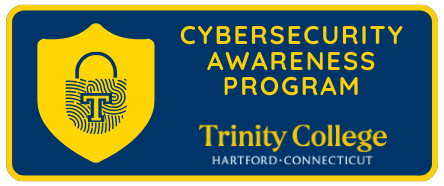Cybersecurity Awareness: Strong Passwords/Passphrase
Your First Line of Defense
Your password/passphrase is the primary mechanism for ensuring the privacy of your computing activity, but it is also the most vulnerable to others who desire unauthorized and illegal access to your data and protected Trinity resources. Having a strong passphrase and protecting it helps keep the entire community safer.
1. Use Strong Passphrases
 Use different passphrases on different accounts. Do not reuse passwords (even if you change or add a character), as repeated passwords are one of the leading causes of unauthorized access.
Use different passphrases on different accounts. Do not reuse passwords (even if you change or add a character), as repeated passwords are one of the leading causes of unauthorized access.- Use the longest passphrase allowed. Use 11 characters or more, a short sentence, or a mix of letters, symbols, and numbers to strengthen your passwords.
- Use a phrase instead of a single word. A group of uncommon or unrelated words is much stronger than a single word. Combined with numbers, symbols, and capitalized letters, such a passphrase is extremely secure.
2. Change Your Password Regularly
Even if you are not prompted to reset your passwords regularly, especially when these passwords allow access to sensitive data such as banking or medical information. We recommend changing your password every few months, or immediately when you feel your password may have been compromised.
3. Use a Password Manager
With just one master password, a password manager can generate and retrieve passwords for every account you have, encrypting and protecting your online information.
Visit the Cybersecurity Awareness page for more ways to make our digital community safer.
